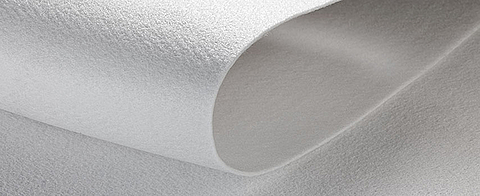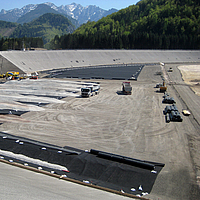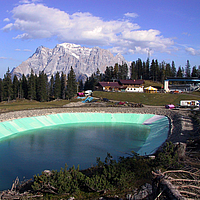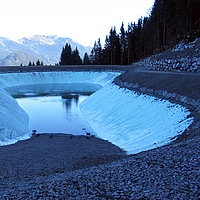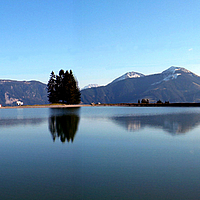HaTe® nonwoven
Separation, protection, filtration and drainage - with weights ranging between 150 g/m2 and 3,000 g/m2.
The properties of HaTe nonwovens are tailored to your particular application. The first step involves the selection of a suitable raw material from a comprehensive range of synthetic staple fibres, which are mechanically bonded by needle-punching. Special fibre mixes producing low-flammability nonwovens are, for example, used on tunnel projects.
Depending on requirements, HaTe nonwovens are manufactured in Geotextile Robustness Classes 1-5 to "M Geok E" ("Guidance Paper on the Use of Geosynthetics in Earthworks for Roadbuilding Projects"), issued by the FGSV (German Road and Transportation Research Association).
For landfill construction, HaTe reinforced nonwovens are specially manufactured for the protection of thermoplastic liners. The composite product comprises a high-density, mechanically consolidated nonwoven reinforced by a woven layer. Reinforced nonwovens are manufactured in weights between 1,000 g/m2 and 3,000 g/m2.
Other functions performed by HaTe nonwovens, particularly at landfill sites, include drainage, separation and gas removal.
HaTe nonwovens can be customised to the specific requirements of your projects.
Features
High flexibility
Good filtration stability under dynamic conditions
Robust
Offers reliable protection
Low transverse contraction
Wide-ranging configurations to suit requirements
Why choose HaTe nonwovens?
HaTe nonwovens are custom-manufactured to your specifications. To ensure that all products you receive meet HUESKER's stringent quality standards, each nonwoven produced by the company is subject to a certified quality assurance process.
Particularly in the environmental technology field, e.g. for the long-term sealing of landfill sites, HaTe nonwovens are well-equipped to meet the stringent ecological and safety requirements.
